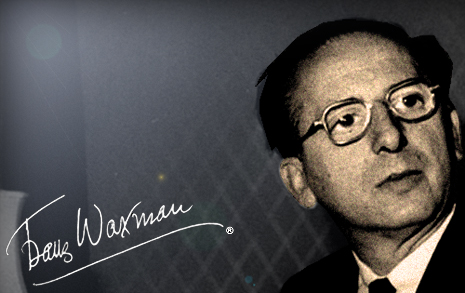|

No rational individual would claim anything positive or constructive about anti-Semitism in concept and practice. In a strangely perverse and indirect but very real way, though, its existence and pursuit in Europe before the Second World War actually brought a benefit to the United States, in the sense that Europe’s exodus of skill, talent and genius was America’s gain: Artists in all fields who discerningly foresaw the impending calamities wisely relocated from Europe to America (often via other countries), many ultimately settling in California.
Composer Franz Waxman was one of them. He occupies a special place in the pantheon of composers in Hollywood.
The history of music is filled with composers whose fathers opposed their sons’ wishes to make music their lives’ work. George Frederick Handel, Hector Berlioz, Frederick Delius (whose lengthy stay in Florida was fundamental to his later work), and Leonard Bernstein are among them, as is Waxman. Berlioz was goaded into medical study by his father; his first experience watching an autopsy was also his last and he fled from the school, never to return. After Bernstein had become a veritable musical icon, his father, Samuel, was asked how he now felt about his former vehement opposition to his son’s choice of music as a life. His arresting reply was, “How was I supposed to know he was Leonard Bernstein?”
The family name was Wachsmann when Franz was born in Königshütte, Germany (now Chorzow, Poland), in December, 1906. A fine pianist with an early and marked aptitude for composing music, he studied in Dresden and then in Berlin, and played for a time with the Weintraub Syncopaters, one of Europe’s most popular jazz ensembles.
In 1930 Friedrich Holländer (later, in Hollywood, Frederick Hollander) was composing the music for a film and recommended the studio engage the 24-year-old Waxman. It was he who orchestrated and conducted Holländer’s score for Marlene Dietrich’s now-classic film, The Blue Angel.
 Devil in Disguise: Marlene Dietrich in The Blue Angel. Devil in Disguise: Marlene Dietrich in The Blue Angel.
*********
In 1934 an incident occurred that had literally far-reaching consequences that altered the course of Franz Waxman’s life. He was attacked and severely beaten by Nazi hoodlums on a Berlin street. Fortunately for him and posterity he had the foresight and prudence—and the wisdom—to leave Germany with his bride-to-be: Abandoning virtually everything, they boarded a train for Paris that very night. Waxman found lodgings at the Hotel Ansonia, some of whose residents were other refugees like Billy Wilder, Fritz Lang and Peter Lorre. Waxman soon settled in California, where in 1935 his first dramatic score for an American film was for The Bride of Frankenstein, now a classic of its genre.
Countless musicians (like Alfred Newman and Victor Young) who scored films came to Hollywood via Broadway, or from a European “theatre” background and environment (e.g., Max Steiner and Ernest Gold, in Vienna). Like his friend and Hungarian colleague in Hollywood, Miklós Rózsa, Waxman was a product of music conservatories (Rózsa could read music before he could read words), and both men were composing concert music long before they ever even thought of entering a film studio.
Many composers reach a certain peak of musical maturity and remain at that level. Felix Mendelssohn comes to mind as an example. On the other hand, during his long and profitable career in Hollywood—his roster of film scores is quite lengthy—Waxman continued to develop as a composer throughout his musical life, just as Beethoven before him had done. Waxman was the first composer to win the Oscar two years in succession: in 1950 for Sunset Boulevard and in 1951 for A Place in the Sun, both of which are now classics.
Among his dozens of other film scores were those for The Silver Chalice (which introduced to the screen a young actor named Paul Newman), The Spirit of St. Louis (commemorating the 30th anniversary of Lindbergh’s 1927 solo flight across the Atlantic), The Story of Ruth, The Nun’s Story and Demetrius and the Gladiators (20th Century Fox’s sequel to its 1953 movie, The Robe, the first Cinemascope film ever made). The scores Waxman composed for his biblical subject films seem to have special musical spirit. Though entirely a product of his own imagination, it’s a testament to Waxman’s intellect and skill as a composer that the main theme for The Story of Ruth seems to have a more Hebraic flavor than many such authentic melodies.
 'Right Neighborly of Ya: 'Right Neighborly of Ya: Miklós Rózsa and Franz Waxman.
When nominated for an Oscar for The Nun’s Story score, Waxman’s “competition” that year included Ernest Gold for his score for On the Beach and Rózsa for his music for Ben-Hur. The Oscar went to Rózsa (this author remembers watching the telecast). Waxman’s reaction was, “ Ben-Hur deserved to win,” and he added, “Rózsa is the best composer in Hollywood anyway.” Thus spoke Franz Waxman after the ceremonies. His remark was genuine and sincere, and the sentiment exemplifies the kind of man he was: devoid of the professional jealousies that pervaded the film colony. It was Waxman himself who had conducted the orchestra at the West Coast premiere of Rózsa’s Violin Concerto in 1956. |









 'Right Neighborly of Ya: Miklós Rózsa and Franz Waxman.
'Right Neighborly of Ya: Miklós Rózsa and Franz Waxman.
